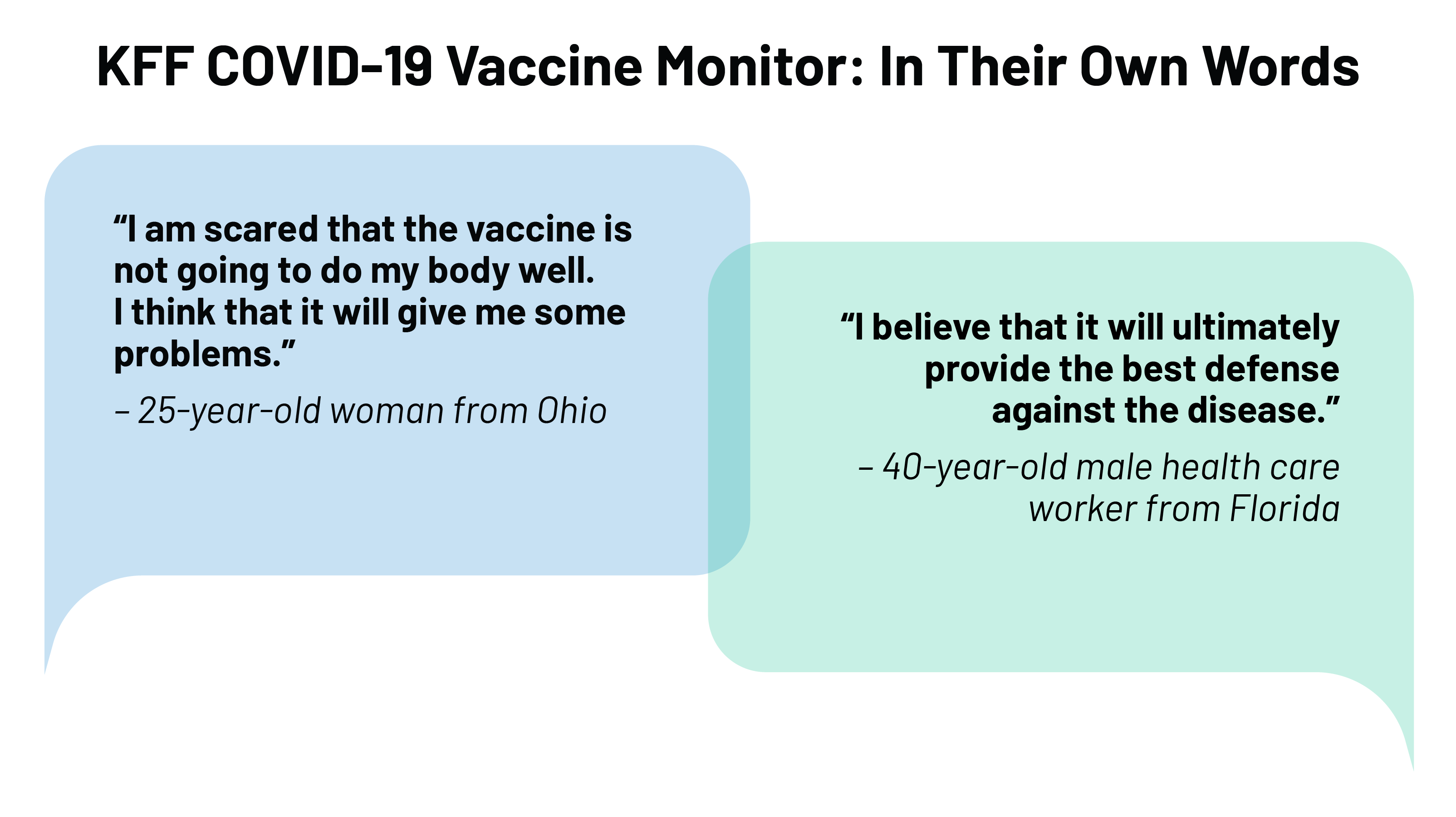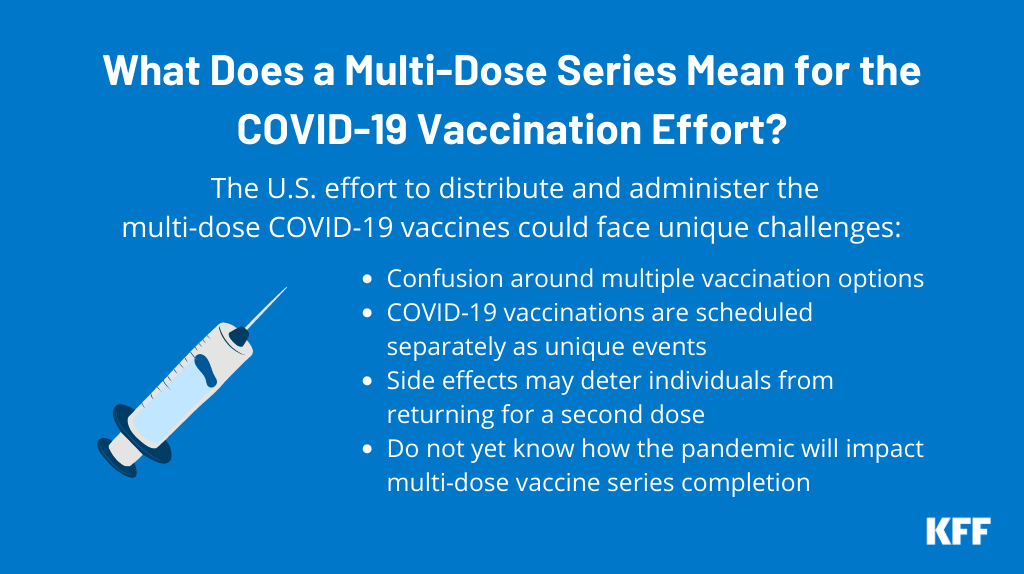Which Best Describe How a Vaccine Works
MRNA vaccines work by introducing a piece of. Vaccines reduce risks of getting a disease by working with your bodys natural defenses to build protection.

Kff Covid 19 Vaccine Monitor In Their Own Words Six Months Later Kff
In cells mRNA uses the information in genes to create a blueprint for making proteins.

. The vaccine acts as an antigen which stimulates the body to produce protective antibodies. That immune system response eventually produces antibodies. Click here to download the script of the animation.
That protein triggers an immune response inside our bodies producing antibodies and activating T-cells to fight off what it thinks is an infection. An mRNA vaccine delivers the instructions for making a bacterial or viral protein to our cells. Vaccines work by helping people safely imitate natural infections.
These vaccines work by delivering some of this mRNA into our cells. To understand how vaccines work it helps to look first at how the immune system works because vaccines harness the natural activity of your immune system. The vaccine itself does not confer immediate protection against disease.
Weve got two really effective vaccines from Pfizer and Moderna. Our immune system then responds to these proteins and develops the tools to. VirusesBacteria and Your Immune System.
Vaccines are like a training course for the immune system. Some vaccines require multiple doses given weeks or months apart. The Centers for Disease Control CDC describes these mRNA vaccines as containing instructions for your cells on how to make a piece of the spike protein that is unique to COVID-19.
Subunit vaccines include only the parts of a virus that best stimulate your immune system. The JanssenJohnson Johnson COVID-19 vaccine is a vector vaccine. Protein subunit vaccines vaccines under development include harmless pieces proteins of the virus that causes COVID-19 instead of the entire germ.
How does vaccination work. When a disease-causing agent such as virus or bacteria invades your body your immune system recognises it as harmful and will trigger a response to destroy it. The immune system is a network of cells tissues and organs that work together to help fight off infection from harmful bacteria or viruses.
How the vaccines work These vaccines will protect you from getting severely ill or dying if you get COVID-19. The vaccine uses messenger RNA genetic material that our cells read to make proteins. 8 hours agoMaya Angelou 1928-2014 Maya Angelou was one of the most respected and renowned figures of the 20th century and is widely regarded as one of the best poets of all time.
Recognizes the invading germ such as the virus or bacteria. That means that vaccines help protect you from diseases without ever having to risk the serious and sometimes deadly consequences of getting sick from those diseases. When foreign invaders such as bacteria or viruses enter.
How vaccines protect you How vaccines protect your community How do we know that vaccines work. Your bodys immune system builds this protection over time. In essence the vaccine tricks the body into thinking it is being attacked although.
AstraZeneca and the University of Oxford also have a vector COVID-19 vaccine. The SARS COV-2 virus got a genetic code of its own. Vaccines help develop immunity by imitating an infection.
But mRNA technology instead teaches our cells how to make a protein or even just a piece of it that will help our immune systems respond. You are best protected 7 to 14 days after your second dose. How Vaccines Work.
When you get a vaccine your immune system responds. Antibodies are proteins produced naturally by the immune system to fight disease. When viruses or bacteria germs invade your body they attack and multiply.
They prepare the body to fight disease without exposing it to disease symptoms. This short animation explains how vaccines enable the body to make the right sort of antibodies to fight a particular disease. Vaccines give you immunity to a disease without you getting sick first.
Vaccination involves the introduction of a substance that the body recognizes as the pathogen preemptively triggering a disease-specific response. Most people who get vaccinated will have immunity protection against the disease. Once vaccinated our bodies recognize that the protein should not be there and build T-lymphocytes and antibodies that will remember how to fight the virus that causes COVID-19 if we are infected in the future.
Producers need to understand how vaccines work to accept the need for a booster vaccination. MRNA from vaccines does not enter the nucleus and does not alter DNA. The molecule called mRNA for short is fragile and would be.
DNA vaccines use small circular DNA molecules called plasmids. For some vaccines genetic engineering is used to make the antigens used in the vaccine. Antigens cause the body to produce antibodies in the blood.
These vaccines are about 95 effective at preventing COVID-19 disease. Vaccines Work Vaccines are very effective and theyre the best protection against many serious diseases. A vaccine works by training the immune system to recognize and combat pathogens either viruses or bacteria.
To trigger your immune system many vaccines inject a weakened or inactivated germ from the virus into our bodies. Its much safer to get a vaccine than to get the disease it prevents. In this section youll learn more about.
Melanie Swift MD COVID-19 Vaccine Allocation and Distribution Mayo Clinic. These molecules are called antigens and they are present on all viruses and bacteria. The vaccines train your immune system to recognise and clear out the virus before it makes you seriously ill.
To do this certain molecules from the pathogen must be introduced into the body to trigger an immune response. Her poems explored themes. Sometimes after getting a vaccine the imitation infection can cause minor symptoms such as fever.
Once cells finish making a protein they quickly break down the mRNA. They are made using killed or weakened versions of the disease-causing germ or parts of the germ called antigens. To introduce a gene from a bacterium or virus to trigger an immune response.
This is sometimes needed to allow for the production of long-lived antibodies and development of memory cells. In this way the body is trained to fight the specific disease-causing organism building up memory of the pathogen so as to rapidly fight it if and when exposed in the future. This type of infection however almost never causes illness but it does cause the immune system to produce T-lymphocytes and antibodies.
Messenger RNA is a type of RNA that is necessary for protein production. By injecting these antigens. This type of COVID-19 vaccine contains harmless S proteins.

What Does A Multi Dose Series Mean For The Covid 19 Vaccination Effort Kff

No comments for "Which Best Describe How a Vaccine Works"
Post a Comment